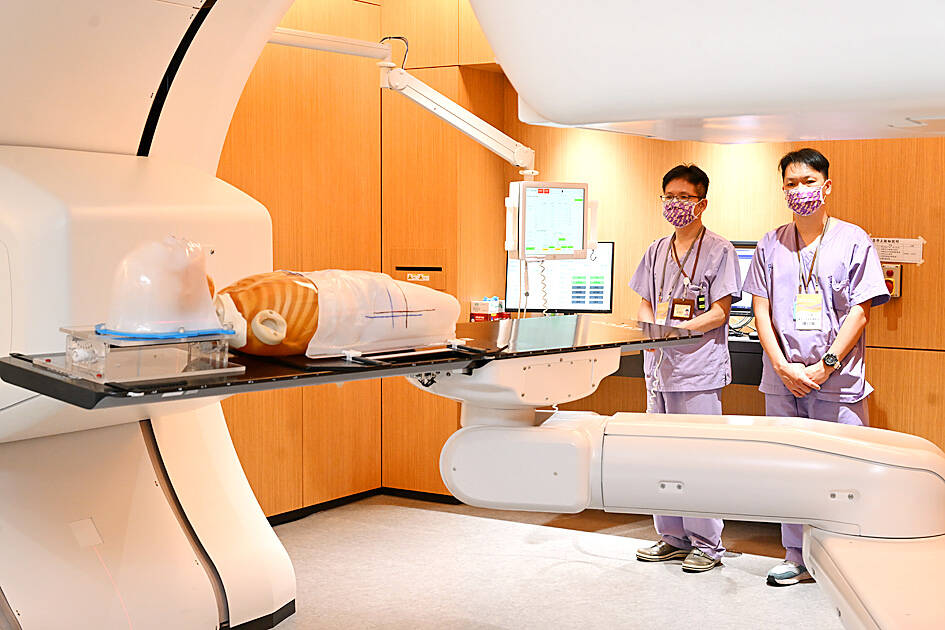Taipei Veterans General Hospital (TVGH) yesterday unveiled the nation’s first heavy ion therapy center, saying 2 percent of its treatment capacity would be reserved for socially disadvantaged people.
The center cost NT$4.5 billion (US$146.04 million), the hospital said.
The hospital launched its heavy particle cancer treatment center project in 2009, and began constructing the center in 2019, hospital superintendent Chen Wei-ming (陳威明) said.

Photo: Tien Yu-hua, Taipei Times
With the help of a Japanese technical team, the hospital completed the center in a record 15 months, Chen said, adding that the installation and verification of equipment was completed five months afterward.
It is the 14th operating heavy ion therapy center in the world and began treating patients at noon yesterday.
There are many treatment methods for cancer such as surgery, chemotherapy, medication therapy, immunotherapy and radiation therapy, Chen said.
Heavy ion therapy is an advanced form of radiation therapy, he said.
It uses carbon ions which are 12 times heavier than protons and can deliver more radiation to tumors with high precision, causing more damage to cancerous cells, he said.
The therapy has a shorter treatment course, is painless and allows patients to return to their normal lives faster than other treatments, Chen said.
Many countries covered by the government’s New Southbound Policy have expressed an interest in the center, he said.
The Mayo Clinic in the US has sent experts to the hospital three times and signed a memorandum of understanding (MOU) last month, Chen said.
The hospital has also signed an MOU with the Taiwan Space Agency, because the center can assist in the radiation protection verification of space components, he said.
President Tsai Ing-wen (蔡英文) said the opening of the center also marks an important milestone in medical cooperation between Taiwan and Japan.
Previously, people in Taiwan who needed heavy ion therapy had to travel to Japan, but now they can receive treatment in Taiwan, while people in other countries can also visit the nation for treatment, she said.
The center is “the last piece of the puzzle” in Taiwan’s precision cancer radiation therapy, and hopefully medical centers nationwide would form a “cancer radiation therapy national team” to provide care to cancer patients and enhance Taiwan’s medical competitiveness globally, Tsai said.
She also thanked the companies that made donations to help build the center.

The manufacture of the remaining 28 M1A2T Abrams tanks Taiwan purchased from the US has recently been completed, and they are expected to be delivered within the next one to two months, a source said yesterday. The Ministry of National Defense is arranging cargo ships to transport the tanks to Taiwan as soon as possible, said the source, who is familiar with the matter. The estimated arrival time ranges from late this month to early next month, the source said. The 28 Abrams tanks make up the third and final batch of a total of 108 tanks, valued at about NT$40.5 billion

Travel agencies in Taiwan are working to secure alternative flights for travelers bound for New Zealand for the Lunar New Year holiday, as Air New Zealand workers are set to strike next week. The airline said that it has confirmed that the planned industrial action by its international wide-body cabin crew would go ahead on Thursday and Friday next week. While the Auckland-based carrier pledged to take reasonable measures to mitigate the impact of the workers’ strike, an Air New Zealand flight arriving at Taipei from Auckland on Thursday and another flight departing from Taipei for Auckland on Saturday would have to

A group from the Taiwanese Designers in Australia association yesterday represented Taiwan at the Midsumma Pride March in Melbourne. The march, held in the St. Kilda suburb, is the city’s largest LGBTQIA+ parade and the flagship event of the annual Midsumma Festival. It attracted more than 45,000 spectators who supported the 400 groups and 10,000 marchers that participated this year, the association said. Taiwanese Designers said they organized a team to march for Taiwan this year, joining politicians, government agencies, professionals and community organizations in showing support for LGBTQIA+ people and diverse communities. As the first country in Asia to legalize same-sex

MOTIVES QUESTIONED The PLA considers Xi’s policies toward Taiwan to be driven by personal considerations rather than military assessment, the Epoch Times reports Chinese President Xi Jinping’s (習近平) latest purge of the Chinese People’s Liberation Army (PLA) leadership might have been prompted by the military’s opposition to plans of invading Taiwan, the Epoch Times said. The Chinese military opposes waging war against Taiwan by a large consensus, putting it at odds with Xi’s vision, the Falun Gong-affiliated daily said in a report on Thursday, citing anonymous sources with insight into the PLA’s inner workings. The opposition is not the opinion of a few generals, but a widely shared view among the PLA cadre, the Epoch Times cited them as saying. “Chinese forces know full well that